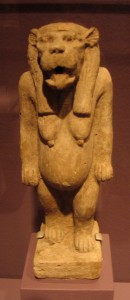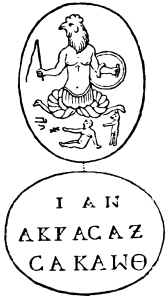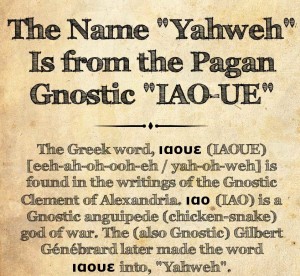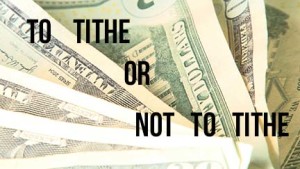Faraón y las Astutas Parteras
Gracias a Lisa Velazquez por traducir este articulo. Puede escucharla a traves de Teshuva.tv los Domingos a las 6pm en el programa radial: Caminando en Obediencia.
Así que, después de publicar El Contexto para Niños episodio #13, donde hablé de la Prueba de Agua atestiguado en varios códigos legales de Asiria y Babilonia, uno de mis parientes me preguntó acerca de las parteras y el primer intento del Faraón de matar a los varones hebreos a través de ellas – así, el engaño de las parteras es una historia divertida una vez que sabes exactamente lo que Faraón creía y cómo las parteras lo utilizaron en su contra. La gente me pregunta por qué yo estudio el antiguo Egipto y esto es un ejemplo de por qué – nunca he visto que se ha enseñado anteriormente, pero para mí tiene perfecto sentido en base a sus creencias religiosas.
Mientras se creía que la diosa Hathor era responsable de la concepción de los niños, dos conocidas deidades menores eran responsables de la protección de la mujer y el bebé durante el parto – Ta-weret y Bes. Yo las llamo las mejores amigas de las parteras.
Ta-weret (Crédito de la imagen), era representada como un hipopótamo con cola de cocodrilo, era la encarnación de los dos grandes peligros del Nilo y como el consorte de Bes, fue responsable de ayudar a las mujeres cuando estaban en parto. Ella era conocida como la protectora del niño Horus (esto será importante más adelante).
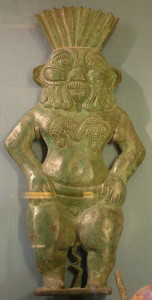 Bes (Crédito de la imagen), su consorte, era representado como un enano o pigmeo y fue a propósito que lo hicieron horrible con una mezcla de características tontas con el fin de ahuyentar a los demonios, serpientes, o cualquier otra persona que causara daño a un bebé – y más tarde servía como amigo del niño. Se le consideraba una presencia reconfortante. Elegí esta imagen en particular porque se puede verlo descansando sobre el símbolo “s-z”, lo cual representa protección. Bes también se asocia con la protección del niño Horus.
Bes (Crédito de la imagen), su consorte, era representado como un enano o pigmeo y fue a propósito que lo hicieron horrible con una mezcla de características tontas con el fin de ahuyentar a los demonios, serpientes, o cualquier otra persona que causara daño a un bebé – y más tarde servía como amigo del niño. Se le consideraba una presencia reconfortante. Elegí esta imagen en particular porque se puede verlo descansando sobre el símbolo “s-z”, lo cual representa protección. Bes también se asocia con la protección del niño Horus.
Así que estos dos, a los ojos de Faraón, eran las deidades responsables de la protección de la madre, el bebé y la bendición del proceso de parto. El faraón que “no conocía a José” dio las parteras hebreas un ultimátum.
Éxodo 1:16: “Cuando ustedes atiendan a las mujeres hebreas y les vean dando a luz,” él dijo, “si es un niño, mátenlo; pero si es una niña, la dejan vivir.”
¡Qué situación tan impensable para esta envuelto! Sin embargo, las valientes parteras se rehusaron a obedecer al Faraón y cuando él lo descubrió, él las llama de nuevo. ¿Cuál es su respuesta y por qué funcionó?
Éxodo 1:19: Las parteras respondieron a Faraón: “Es porque las mujeres hebreas no son como las mujeres egipcias – ellas están de parto y dan a luz antes de que la patera llegue.”
A los ojos de Faraón, esto pone en duda razonable sobre la justicia de lo que está haciendo – él se enfrenta a la posibilidad de que los dioses no podrían estar de su lado. Ta-weret y Bes posiblemente estaban ayudando a las mujeres durante su parto demasiado rápido para antes de que las parteras aparecieran y mataran a los bebés varones.
Su solución al problema es recurrir a otra prueba – la antigua Prueba del Río que se habla en los códigos de Hammurabi (1750 AEC #2 y 132), Ur-Nammu (2100 AEC #13 y 14), y en la tableta A de la Ley Asiria Media (1076 AEC #17, 22, 24 y 25).
La Prueba Rigurosa del Río, o el Juicio por Agua Fría, se reflejan el concepto de que si se tira a alguien en agua profunda fría y sobrevivía, entonces los dioses lo salvaban, pero si se ahogaban era porque los dioses los mataban. No te rías, ellos pensarían que también sería ridículo, si se les decía que el sol es realmente una reacción nuclear autónoma en lugar de Ra remando su barco solar a través del cielo. Es todo una cuestión de lo que normalmente se aceptaba como un hecho y no estamos con mayor rapidez que renunciar a las cosas ridículas que queremos creer tampoco. (Quiero decir, si, por cada vez que vi una revista decir que Jennifer Aniston había teniendo un bebé, que en realidad tuvo un bebé – ella tendría su propio país en este momento y, sin embargo las personas juran por esas revistas. Siempre se equivocan simplemente pasar a la próxima fabricación con el fin de mantener la venta demás revistas al de estilo “1984” jajaja)
Por lo tanto, vamos a decir que el faraón, quien creía absolutamente en la autoridad de sus dioses, tenía una segunda opinión. Si Bes y Ta-weret estaban ayudando a las hebreas, el río no se llevaría a los bebés. Después de todo, Ta-weret representaba las dos amenazas más temibles del Nilo – el hipopótamo y el cocodrilo. Ella salvó al bebé Horus de Set, así que si ella era responsable entonces él lo descubriría.
Aunque el engaño de las parteras fue un éxito divertido al tapar de lana los ojos del Faraón, los bebés, por supuesto, no sobrevivieron la Prueba del Río – excepto, por supuesto, uno. Moisés sobrevivió. Cuando la hija del faraón lo sacó del río, se habría asemejado a la historia de Horus siendo salvado por Ta-Weret de Set. Ella, y más tarde el Faraón, hubieran visto a este niño como si hubiera sido juzgado inocente por los dioses y bajo la protección específica de Ta-Weret y Bes.
Créditos de imágenes:
“Ta-waret figurine (Boston MFA)” by Madman2001 – Own work. Licensed under CC BY-SA 3.0 via Commons –https://commons.wikimedia.org/wiki/File:Tawaret_figurine_(Boston_MFA).jpg#/media/File:Tawaret_figurine_(Boston_MFA).jpg
“Egypte louvre 012”. Licensed under CC BY-SA 1.0 via Commons – https://commons.wikimedia.org/wiki/File:Egypte_louvre_012.jpg#/media/File:Egypte_louvre_012.jpg
Referencias:
Law Collections from Mesopotamia and Asia Minor de Martha T Roth
The Complete Gods and Goddesses of Ancient Egypt de Richard H Wilkinson,
The Gods of Ancient Egypt de Barbara Watterson
The Ancient God’s Speak de Donald B Redford
